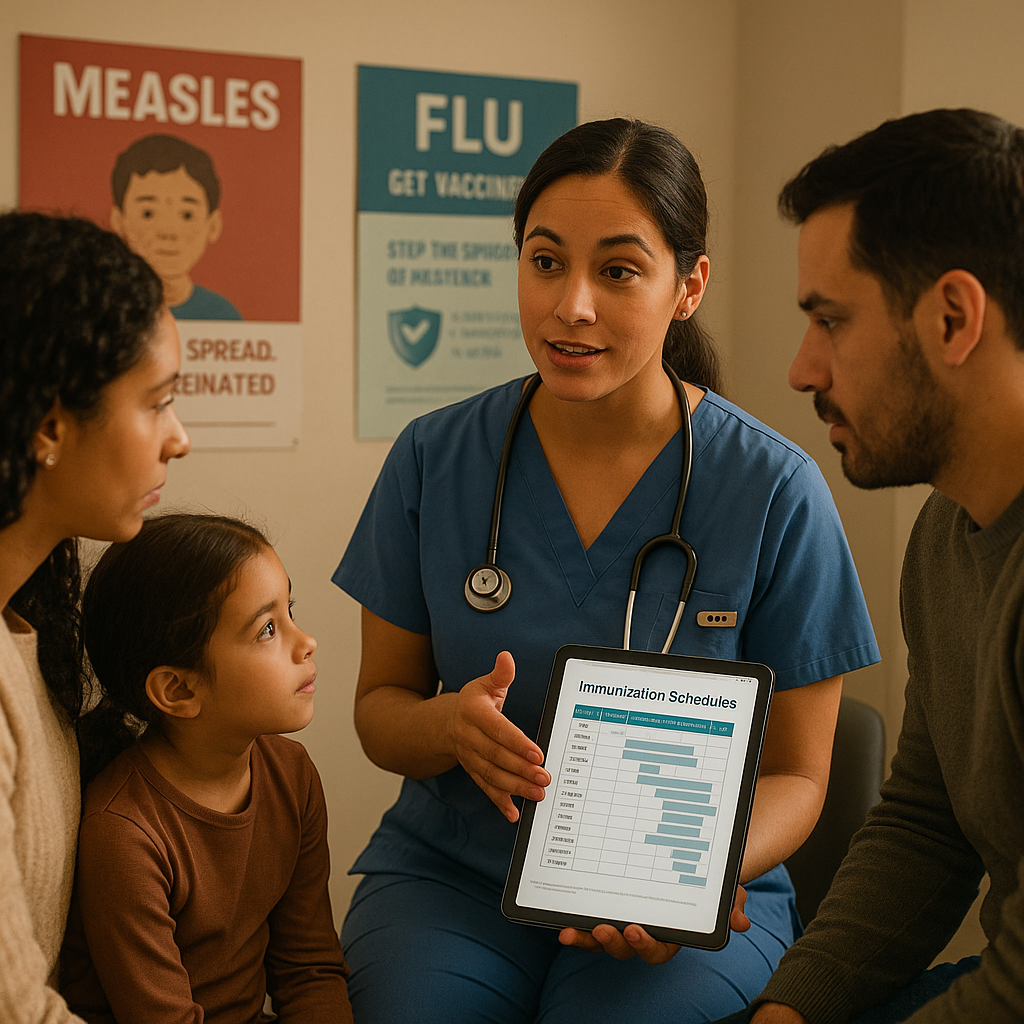The Return of Preventable Diseases
In 2025, several states across the U.S. began reporting new cases of measles, a disease once declared eliminated. These outbreaks led to quarantines, school disruptions, and renewed discussions about declining vaccination rates.
This issue goes far beyond one community—it reflects a global public health challenge that every nurse and nursing student should understand. As the world continues to recover from the pandemic, maintaining strong vaccine coverage is essential to prevent diseases we once thought were gone.
🦠 What Is Measles?
Measles is a highly contagious viral infection caused by the rubeola virus. It spreads through coughing, sneezing, or direct contact with droplets from an infected person. The virus can linger in the air or on surfaces for up to two hours, making it one of the most infectious diseases known.
Common Symptoms:
- High fever
- Cough, runny nose, and red, watery eyes
- Koplik spots (tiny white spots inside the mouth)
- A red rash that starts on the face and spreads throughout the body
Complications:
Measles is not harmless. It can lead to pneumonia, brain swelling (encephalitis), ear infections, and in severe cases, death—especially among children and people with weakened immune systems.
Prevention:
The best protection is the MMR vaccine (Measles, Mumps, Rubella). Two doses provide about 97% protection and are recommended for all children, students, and healthcare workers.
The Real Problem: Falling Vaccination Rates
Despite the proven effectiveness of vaccines, global vaccination rates have declined. According to health experts, even a small drop in vaccination coverage can cause outbreaks of diseases like measles or whooping cough.
Several factors contribute to this problem:
- Misinformation and fear spread through social media
- Reduced access to healthcare in rural or underserved areas
- Vaccine hesitancy among parents or adults
For nurses and nursing students preparing for the NCLEX, this trend highlights the importance of public health awareness, education, and infection prevention—key topics in every nursing bundle and real-life practice.
Why This Matters for Nurses
1. Nurses Are Trusted Health Advocates
Year after year, surveys show that registered nurses (RNs) are the most trusted professionals. Patients often turn to nurses for honest, understandable advice about vaccines.
Nurses can make a difference by:
- Explaining how vaccines work and why they’re safe
- Addressing concerns calmly and respectfully
- Sharing verified information from credible sources like the CDC and WHO
2. Outbreaks Strain the Healthcare System
When vaccination rates drop, hospitals face higher patient loads, increased infection risk, and resource shortages. Nurses in emergency, pediatrics, and community health settings often bear the greatest workload during these outbreaks.
Strong knowledge of infection control, isolation procedures, and disease transmission helps RN nurses keep patients—and themselves—safe.
3. Education Is the Best Prevention
Nurses are educators at heart. Whether teaching families about vaccine schedules or guiding nursing students, education is one of the most powerful tools in disease prevention.
For those preparing for the NCLEX, understanding vaccine schedules, isolation precautions, and herd immunity is essential. Using nursing bundles focused on infection control can help reinforce this knowledge effectively.
Rebuilding Public Trust in Vaccines
To stop the return of preventable diseases, the healthcare system must rebuild confidence in vaccines. Nurses can take the lead by:
- Promoting vaccine literacy through community outreach and clinics
- Encouraging routine immunizations for both children and adults
- Advocating for evidence-based health policies
- Staying updated through continuing education and professional development
When nurses confidently promote vaccination, they inspire trust and protect lives.
💡 Key Takeaways
✅ Vaccine-preventable diseases are increasing due to declining immunization rates.
✅ Nurses play a vital role in education, prevention, and infection control.
✅ Vaccine knowledge is a crucial part of NCLEX preparation and daily nursing practice.
✅ As the most trusted healthcare professionals, RNs can help restore public confidence in science-based care.
Final Thoughts
Measles outbreaks and other preventable infections remind us that public health progress is fragile. Every nurse, from student to seasoned RN, has a role to play in protecting communities through vaccination education and preventive care.
By staying informed and proactive, we not only save lives but also strengthen the foundation of nursing itself—compassionate, evidence-based care.
🩺 Frequently Asked Questions (FAQ)
Vaccine-preventable diseases like measles and whooping cough are reappearing mainly due to declining vaccination rates and growing vaccine hesitancy. Misinformation online, reduced access to healthcare, and distrust in vaccines have created immunity gaps, allowing these diseases to spread again—even in developed countries.
Nurses are the frontline defenders against infectious diseases. They play key roles in:
Educating patients and families about the importance of vaccines.
Ensuring accurate documentation of immunizations.
Identifying and reporting suspected cases early.
Implementing infection control and isolation procedures when needed.
By staying informed and proactive, every registered nurse (RN) helps protect their community.
NCLEX often includes questions about infection control, disease prevention, and patient education. Nursing students should review:
Vaccine schedules (especially MMR, influenza, and hepatitis).
Isolation precautions and infection control principles.
How to respond to patients who refuse or question vaccines.
Using nursing bundles or study guides that focus on infection prevention and public health is a great way to master these topics before the exam.

